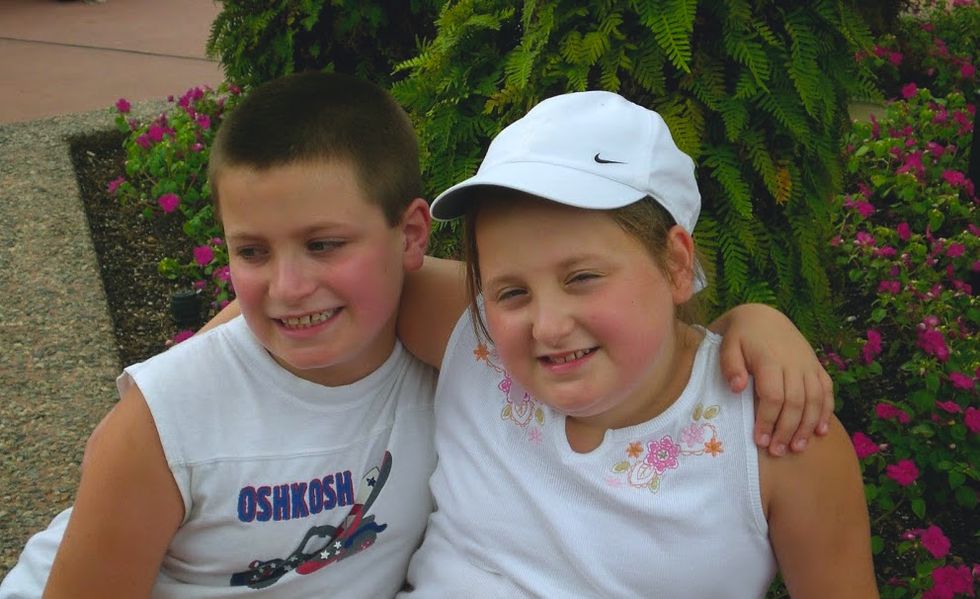I have been blessed with the rare opportunity of going through life with a fraternal twin brother, and his name is Ryan. While we look similar, he takes far more after my mother than I do. He has her dark hair, fair skin, and large, stormy blue eyes. He could eat cheeseburgers for every meal, loves cars, cats, and trains, can spend hours watching YouTube videos on his tablet, has the propensity to wear shorts and polo shirts in all forms of weather, is silly and kind, exclusively refers to me as ‘Alley,’ and went through a phase where the only music he listened to was by either Michael Jackson or Stevie Wonder.
See also: The Day My Brother With Down Syndrome Became A Viral Meme
Oh, and in case I forgot to mention it, Ryan has autism spectrum disorder. He’s been diagnosed with it since we were four, after a very well-meaning family friend (who is a special education expert) recommended to my parents that Ryan be evaluated for autism when a day of playing in the snow turned into an especially unstoppable meltdown.
People never seem to know what to do when they learn I have a twin brother with autism. It starts when people learn that I have a twin, and then proceed to ask what college he’s going to. After I patiently explain that Ryan has autism and is not going to college, but instead is completing a program at home that helps people who are differently-abled learn jobs skills and find employment, there is a beat of suffocating, uncomfortable silence. Whoever I am talking to either awkwardly murmurs an apology, or is excited about Ryan’s prospects. I obviously prefer the latter option.
People also overwhelmingly ask me what it is like to have a twin brother with autism. To be honest, I am somewhat offended by this question. Before any diagnosis, Ryan is my brother, and having siblings is not a unique experience. While I understand what people mean when they ask this question, I cannot give them a clear answer. Ryan has always been Ryan to me. While I noticed from a young age that he did not quite act like everyone else, it didn’t strike me as odd. Everyone has their own brand of peculiar, and Ryan’s was just a tad stronger than most.
So I give the generic, cookie-cutter answer that having a twin brother with autism has made me more patient, understanding, and protective. While all of these statements are to a degree true, it feels like an answer I provide to people so they can smile and think about how my brother’s diagnosis has made my life better. It spares them from feeling anything unpleasant.
I am still learning how to be a good ally to people with autism, especially Ryan. At times I have to stop and remind myself that he views the world from a different lens that I do. To him, it is completely acceptable to shave his legs or to approach strangers in the grocery store to ask them about the type of car they have, or innocently inquire if they have any pets. He cannot not fathom why anyone, my family included, would advise him against those things.
At times I have to stop and remind myself that some of the tasks I complete and take for granted might be difficult for Ryan.
At times I have to stop and remind myself his brain is fashioned in a way that is dissimilar to mine, and that is completely and entirely okay.
But there is an honest answer that I never give people when they ask me what it is like to have a twin brother with autism, and I have decided that now is the time to share it.
My lesson is this: We do not live in a society that knows how to provide full lives for the differently-abled.
The moments where Ryan, crying out of frustration and anger, wishes he had never been born because he knows he is different, should not exist, but they do. And those moments fill me with sorrow and rage, because my brother should never have to feel like he does not belong.
Ryan’s struggle is not singular in any way. According to the Center for Disease Control, one in 68 children fall somewhere on the autism spectrum, and yet our society does not know how to help these children.
Ryan bounced from school to school as a child because we could not find any elementary school that adequately knew how to educate him. While my parents were fortunate enough to find a therapy group that helped Ryan with behavioral issues, a lot of families do not have access to those resources.
As high school graduation approached, my parents had to bargain and plea with my school to help Ryan join the occupational program he is currently a part of. If it had been up to my school's faculty, Ryan would have stayed in high school for at least another year, and then would have been sentenced to a menial job, the type that so many differently-abled people are shoved into.
Advocating for my brother’s rights to education, treatment, and even a future has been a lifelong battle waged by my parents.
While our society is not as accepting as it should be, I have faith that it will be better. The amount of kindness and support that Ryan and my family has received has moved me to the point of tears. I will continue to work towards a future where absolutely everyone has the opportunities they deserve.
Ryan, I love you, and could not imagine my life without you as my twin. I will forever and always be so proud of you.






































